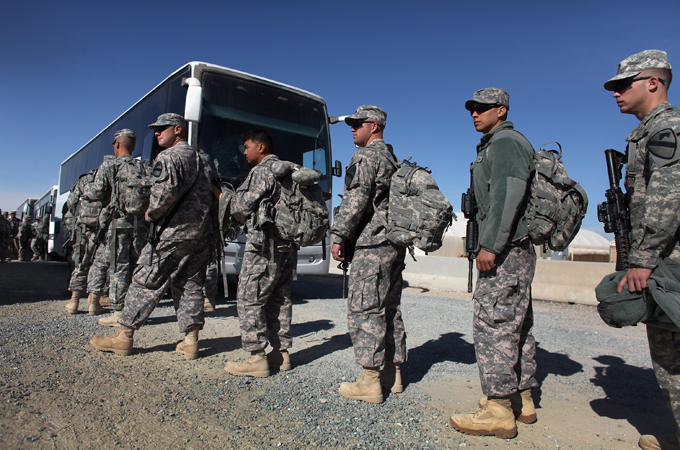Iraqis who aided US left behind and fearful
Long delays for visas mean thousands of former interpreters for US remain in Iraq, afraid of assassination.
![US troops leaving Iraq [GALLO/GETTY]](/wp-content/uploads/2011/12/20111216175743603734_20.jpeg?resize=570%2C380&quality=80)
 |
| Tens of thousands of Iraqis who helped US forces are worried about their departure [GALLO/GETTY] |
Baghdad, Iraq – It was supposed to be a simple deal: Work with the American occupation here for one year, and earn a visa to resettle in the United States.
John put in 27 months as a linguist and adviser, both with the military and with a Provincial Reconstruction Team (PRT) attached to the US embassy in Baghdad. Last November, midway through his tenure with the Americans, he applied for a visa under a special State Department programme.
Thirteen months later, he is still waiting for an answer, and worries that he might be killed before he gets one: The Iraqi government has been gathering details about people who worked with the US military, and John fears that information could be leaked to armed groups; and he has received several anonymous, harassing phone calls from people who know about his work history.
“It’s a fact to these people, we betrayed our country, anyone who worked with the Americans,” he said in an interview. “They think we don’t even deserve to be Iraqi.”
Huge backlogs
As the last US troops depart Iraq this month, they leave behind thousands of former colleagues, like John, who thought they would have emigrated by now. (John is not his real name, of course; he asked to remain anonymous, both to protect his safety in Iraq and his visa application in the United States.)
More than 140,000 Iraqis worked with the United States during the nearly nine-year war and occupation., and tens of thousands have since applied for immigration visas in the United States.
The US issued only a handful in the early years of the war. A law passed in 2008 created the Special Immigrant Visas (SIV) programme, which was supposed to expedite the process: It allocated 25,000 visas over five years for Iraqis who worked with Americans and face an “ongoing threat” in their home country.
But four years later, only about 7,000 of those visas have been issued, according to the State Department, with more than 30,000 applications pending a decision.
The process has become especially slow this year, after the Obama administration started requiring more detailed background checks for visa applicants. Just nine people received visas under the SIV programme during the entire month of April.
“We’re concerned about anybody who’s at risk in this country,” said James Jeffrey, the US ambassador here. “We have programmes that allow some of them to travel to the US, and huge backlogs in these programmes, that’s true… a lot of it is the processing back in Washington.”
Iraqis who worked with the US say those risks are escalating now that the last American troops are preparing to leave.
“All of the people around me know that I was working with the Americans,” said Mark, another former PRT adviser. “Anybody who was against the US troops, I feel that I am in danger from them.”
The average wait for the SIV programme is now more than nine months, even for those Iraqis with clean records and good recommendations. John’s visa application paperwork, which was reviewed by Al Jazeera, includes a glowing letter from his supervisor, who described him as a “reliable professional with great integrity”.
A separate “threat statement” outlined the dangers he faces if he remains in Iraq, noting that he has received several threats from members of Jaish al-Mahdi, a Shia militia.
“These insurgent groups and some of the local Iraqi population consider [him] a traitor,” the statement said.
‘This is crazy’
And so they wait, thousands of them, often in hiding. The Iraqi newspaper Sabah al-Jadid reported last month that many former interpreters were throwing away any paperwork that identifies them as such.
Of a half-dozen interpreters contacted for this story, only two were willing to discuss their situation.
“For nine months I am jobless, waiting for that visa. I have nothing to do,” Mark said.
Others have fled the country: More than 18,000 Iraqis who applied for the SIV programme are currently in neighbouring Syria and Jordan, according to the United Nations.
Mark, who worked for more than two years with reconstruction teams in Baghdad and Anbar provinces, has been waiting nearly ten months for a visa; he was interviewed for the SIV programme in March, and has heard little from the embassy since.
“They said we should wait at least six months, but this is crazy,” he said. “All the people around me know that I was working with the Americans. We feel that we are in danger from anyone who was against the US troops.”
Neither the Iraqi nor American governments have kept detailed statistics, but more than 300 Iraqis who worked with the US have been killed since the war began.
They are targeted by a variety of armed groups, both Sunni and Shia. John said he has received several calls this year from people with detailed information – not just that he worked for the Americans, but where he worked, and what he advised them on.
“They’ll call and say, ‘hi, is this John from the PRT?’” but using his real name, John said. “And they’ll say, we need you to come up to Tarmiya,” a neighbourhood where his unit used to work.
He suspects that someone sold the information to an armed group. Provincial reconstruction teams used to spend heavily – buying greenhouses for farmers, for example – but that money has dried up as the teams closed down.
“So after we’re done… then okay, there’s not any more interest in the relationship, so they give it [the information] to whoever will pay,” he said. “I don’t feel safe… I’m afraid of these groups, and the Iraqi government, I don’t trust at all.”